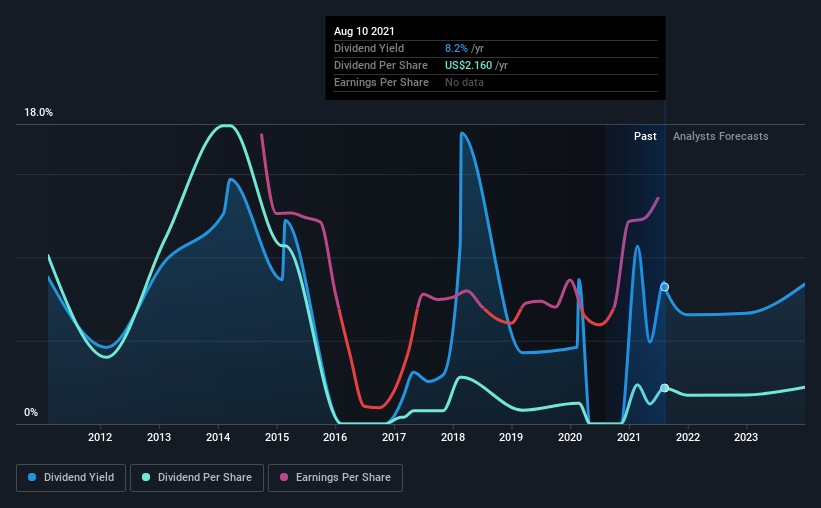Here's What We Like About Sculptor Capital Management's (NYSE:SCU) Upcoming Dividend
Readers hoping to buy Sculptor Capital Management, Inc. (NYSE:SCU) for its dividend will need to make their move shortly, as the stock is about to trade ex-dividend. The ex-dividend date is one business day before a company's record date, which is the date on which the company determines which shareholders are entitled to receive a dividend. The ex-dividend date is important as the process of settlement involves two full business days. So if you miss that date, you would not show up on the company's books on the record date. Therefore, if you purchase Sculptor Capital Management's shares on or after the 16th of August, you won't be eligible to receive the dividend, when it is paid on the 24th of August.
The company's next dividend payment will be US$0.54 per share, on the back of last year when the company paid a total of US$2.16 to shareholders. Last year's total dividend payments show that Sculptor Capital Management has a trailing yield of 8.2% on the current share price of $26.28. We love seeing companies pay a dividend, but it's also important to be sure that laying the golden eggs isn't going to kill our golden goose! So we need to investigate whether Sculptor Capital Management can afford its dividend, and if the dividend could grow.
View our latest analysis for Sculptor Capital Management
Dividends are usually paid out of company profits, so if a company pays out more than it earned then its dividend is usually at greater risk of being cut. Sculptor Capital Management paid out a comfortable 33% of its profit last year.
Generally speaking, the lower a company's payout ratios, the more resilient its dividend usually is.
Click here to see the company's payout ratio, plus analyst estimates of its future dividends.
Have Earnings And Dividends Been Growing?
Stocks in companies that generate sustainable earnings growth often make the best dividend prospects, as it is easier to lift the dividend when earnings are rising. Investors love dividends, so if earnings fall and the dividend is reduced, expect a stock to be sold off heavily at the same time. That's why it's comforting to see Sculptor Capital Management's earnings have been skyrocketing, up 46% per annum for the past five years.
Another key way to measure a company's dividend prospects is by measuring its historical rate of dividend growth. Sculptor Capital Management has seen its dividend decline 14% per annum on average over the past 10 years, which is not great to see. Sculptor Capital Management is a rare case where dividends have been decreasing at the same time as earnings per share have been improving. It's unusual to see, and could point to unstable conditions in the core business, or more rarely an intensified focus on reinvesting profits.
The Bottom Line
From a dividend perspective, should investors buy or avoid Sculptor Capital Management? Typically, companies that are growing rapidly and paying out a low fraction of earnings are keeping the profits for reinvestment in the business. This is one of the most attractive investment combinations under this analysis, as it can create substantial value for investors over the long run. In summary, Sculptor Capital Management appears to have some promise as a dividend stock, and we'd suggest taking a closer look at it.
While it's tempting to invest in Sculptor Capital Management for the dividends alone, you should always be mindful of the risks involved. Every company has risks, and we've spotted 4 warning signs for Sculptor Capital Management you should know about.
We wouldn't recommend just buying the first dividend stock you see, though. Here's a list of interesting dividend stocks with a greater than 2% yield and an upcoming dividend.
This article by Simply Wall St is general in nature. We provide commentary based on historical data and analyst forecasts only using an unbiased methodology and our articles are not intended to be financial advice. It does not constitute a recommendation to buy or sell any stock, and does not take account of your objectives, or your financial situation. We aim to bring you long-term focused analysis driven by fundamental data. Note that our analysis may not factor in the latest price-sensitive company announcements or qualitative material. Simply Wall St has no position in any stocks mentioned.
Have feedback on this article? Concerned about the content? Get in touch with us directly. Alternatively, email editorial-team (at) simplywallst.com.

 Yahoo Finance
Yahoo Finance 
